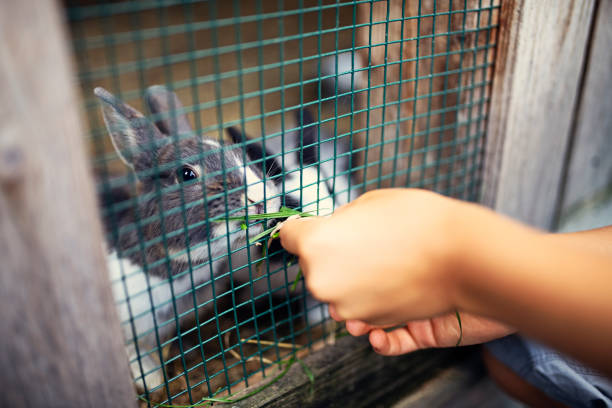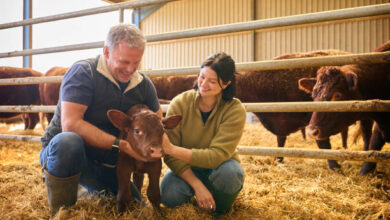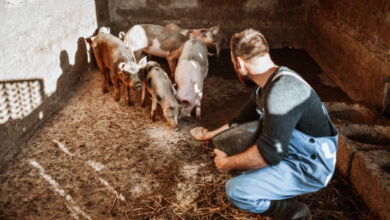Can Rabbits Eat Blackberries? All You Need To Know

Can Rabbits Eat Blackberries? All You Need To Know
When it comes to feeding your rabbit, knowing which foods are safe and nutritious is crucial. Many rabbit owners wonder, “Can rabbits eat blackberries?” Understanding the dietary needs of rabbits and the safety of different fruits can help you make informed decisions for your furry friend. In this guide, we’ll explore whether blackberries are a suitable treat for rabbits and how to incorporate them into their diet safely.
Understanding Rabbit Nutrition
To keep your rabbit healthy and happy, it’s essential to understand its nutritional needs. Rabbits require a balanced diet rich in fiber, vitamins, minerals, and water. The following components are crucial to their diet:
- Basic Dietary Needs of Rabbits
Hay
Hay is the cornerstone of a rabbit’s diet and should make up the majority of their daily intake. It provides essential fiber, which is critical for maintaining a healthy digestive system and preventing gastrointestinal issues like stasis. Hay also helps wear down a rabbit’s continuously growing teeth, preventing dental problems.
Types of Hay: Timothy hay is the most commonly recommended, but other varieties like orchard grass and meadow hay are also suitable. Alfalfa hay is appropriate for young, growing rabbits due to its higher protein and calcium content but should be limited for adult rabbits.
Fresh Vegetables
Fresh vegetables are a vital part of a rabbit’s diet, supplying essential vitamins and minerals. Leafy greens should be the primary vegetable source, with other vegetables added in smaller quantities.
Leafy Greens: Examples include romaine lettuce, kale, parsley, and cilantro. Aim to provide a variety of greens to ensure a broad range of nutrients.
Other Vegetables: Carrots, bell peppers, and broccoli can be included in moderation. Introduce new vegetables gradually to monitor for any digestive issues.
Pellets
Commercial rabbit pellets are formulated to provide a balanced diet, containing a mix of fibers, proteins, and essential nutrients. However, they should only supplement the diet, not serve as the primary food source.
Choosing Pellets: Select high-quality pellets with high fiber content (at least 18%) and low in proteins and fats. Avoid pellets with added dried fruits, seeds, or nuts, as these can be unhealthy for rabbits.
Water
Fresh, clean water must always be available to rabbits. Proper hydration is crucial for their overall health and supports digestion and other bodily functions.
Water Delivery: Provide water in a sipper bottle or a heavy ceramic bowl to prevent tipping. Ensure the water source is cleaned regularly to avoid contamination.
- The Role of Fruits in a Rabbit’s Diet
Fruits can be a delightful and nutritious treat for rabbits but should be given sparingly due to their high sugar content. When incorporated properly, fruits can offer additional vitamins and hydration.
Frequency and Quantity: Offer fruits no more than 1-2 times a week. Limit the serving size to one or two small pieces to prevent digestive upset.
Safe Fruits: In addition to blackberries, safe fruits for rabbits include apples (without seeds), blueberries, strawberries, and raspberries. Always introduce new fruits slowly to monitor for any adverse reactions.
- Nutritional Balance and Monitoring
Maintaining a balanced diet is critical for a rabbit’s health. An imbalanced diet can lead to obesity, dental issues, and other health problems. Monitoring your rabbit’s weight and overall condition helps ensure they are receiving the right nutrients.
Regular Health Checks: Perform routine checks for signs of weight loss or gain, changes in fur condition, or any behavioral changes that might indicate health issues.
Veterinary Advice: Regular veterinary visits are essential to keep your rabbit’s diet and health in check. A vet can provide personalized dietary recommendations based on your rabbit’s specific needs.
You May Love To Read
Can Rabbits Eat Tomatoes? Benefit and Risks
Can Rabbits Eat Grapes? Everything You Need to Know
Benefits of Blackberries for Rabbits
When given in appropriate amounts, blackberries can offer several health benefits:
– Vitamins: Support immune function and overall health.
– Hydration: Help keep your rabbit hydrated due to their high water content.
– Antioxidants: Aid in protecting cells from damage.
Feeding Blackberries to Rabbits
- How Much Blackberry is Safe?
Rabbits can safely eat blackberries in small quantities. A general guideline is:
Serving Size: One or two blackberries a couple of times a week.
Too many blackberries can lead to digestive issues due to their sugar content.
Preparing Blackberries for Your Rabbit
- Before feeding blackberries to your rabbit:
Wash Thoroughly: Remove any pesticides or contaminants.
Serve Whole or Halved: Depending on your rabbit’s size, you can serve the berries whole or cut in half.
Signs of Overfeeding or Allergic Reactions
Monitor your rabbit for any adverse reactions, such as:
Digestive Issues: Diarrhea or soft stools.
Allergic Reactions: Swelling, itching, or unusual behavior.
If you notice any of these symptoms, discontinue feeding blackberries and consult your vet.
Other Fruits Safe for Rabbits
List of Rabbit-Safe Fruits
In addition to blackberries, rabbits can enjoy:
– Apples (without seeds)
– Blueberries
– Strawberries
– Raspberries
– Pineapple (in small amounts)
Fruits to Avoid
Certain fruits are harmful or toxic to rabbits, including:
– Avocado
– Grapes and Raisins
– Cherries
– Tomato Leaves
– Rhubarb
Tips for a Balanced Rabbit Diet
Incorporating Fruits and Vegetables
To ensure a balanced diet:
Variety: Offer a mix of hay, vegetables, and occasional fruits.
Moderation: Limit fruit treats to prevent excessive sugar intake.
Monitoring Your Rabbit’s Health
- Regularly check your rabbit’s health:
Weight: Ensure your rabbit maintains a healthy weight.
Behavior: Watch for any changes in eating habits or activity levels.
Veterinary Checkups: Schedule regular visits to your vet to keep your rabbit in optimal health.
Conclusion
Blackberries can be a healthy and enjoyable treat for rabbits when fed in moderation. Understanding your rabbit’s nutritional needs and incorporating safe, nutritious foods into their diet will help ensure they lead a happy and healthy life. Have you tried feeding blackberries to your rabbit? Share your experiences and tips in the comments below!




